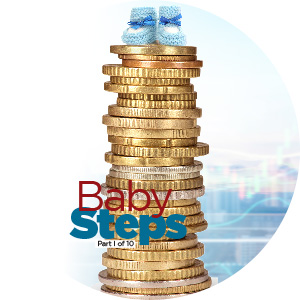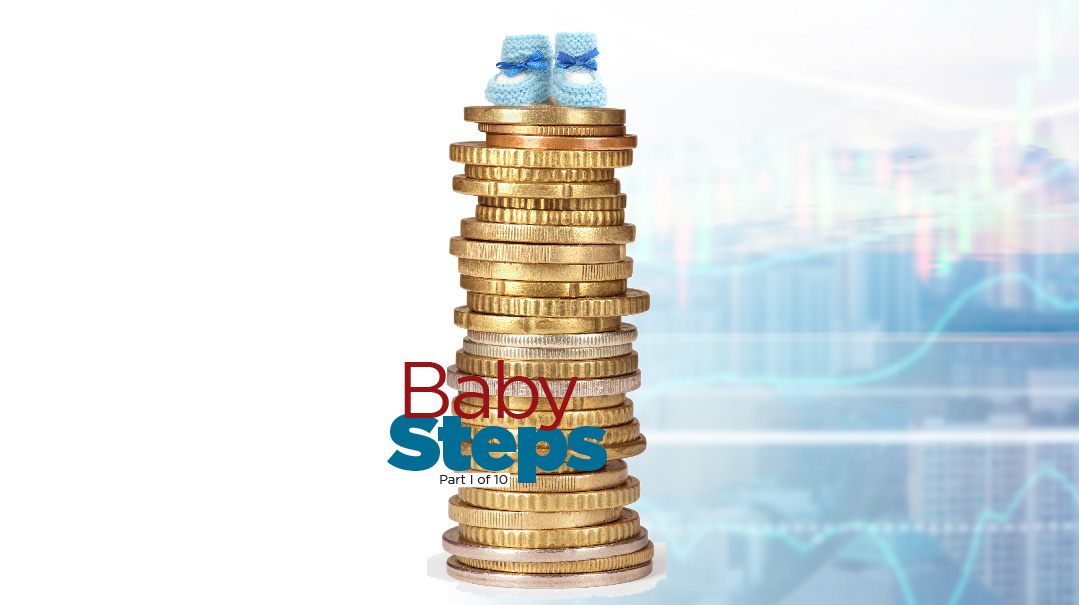Baby Steps: Part 6 of 10
| June 1, 2021"Is it really that big of a deal to spend a few dollars here or there? Why budget instead of just living your life?”
November 2017
The Shabbos candles glowed gently in our kitchen, their light reflecting off the metal leichter below. Three candles stood on the counter this week: two tall ones for Nat and me, and a short tea light for the baby we had lost shortly after finishing Baby Step 2.
“V’zakeini l’gadel…” I recited softly. Like every week, I poured my tefillos out to Hashem and asked Him to grow our family, then retreated to the couch to read until Nat came home with our guests. I’d been our shul’s hachnassas orchim coordinator for the past year, which meant that most Shabbos meals were filled with new people around our table.
As I sat down, I felt unsettled, but I couldn’t quite place why. I tried to push the feeling away, and managed to read a few chapters before I heard Nat open the door to our condominium building. As his keys rattled in the lock, I smoothed my (new-to-me) sheitel, bought on consignment, and got up to greet our guests Dovid and Yitzchak, two businessmen visiting our midwestern community from the East Coast. We filed into the dining room, and soon were feasting on dinner.
“Before Shabbos, Nat was telling me about this Dave Ramsey guy you both follow,” said Dovid. “He seems a little extreme.... I mean, does it really matter how you spend your money? It’s all from Hashem anyway.”
Nat and I glanced at each other with the same thought: Do you want to explain, or should I?
“Go ahead,” I said to Nat, smiling. We’d had this conversation before.
“You’re 100 percent right,” Nat answered our guest. “Everything in our lives is a brachah from Hashem. But we need to take good care of the gifts that He gives us. Just like our physical and spiritual health, we’re responsible for maintaining our financial health as well. And, ultimately, our goal is to give more to tzedakah — we don’t mind reducing our expenses in order to give more down the line.”
“Hmm,” said Dovid, thinking. “I hadn’t thought of it that way. But is it really that big of a deal to spend a few dollars here or there? Why budget instead of just living your life?”
Nat looked at me, and I nodded. My turn to explain.
“You’d be really surprised at how far you can get when you focus on a goal. A few dollars here and there can add up quickly,” I replied.
“Plus, we’ve been budgeting for a couple of years now, and we find that it actually gives us the freedom to spend without worry, since it’s been planned out in advance each month,” added Nat. We’d seen the power of budgeting in our own lives — we were out of debt and would be finishing up Baby Step 3 that month, which meant that we would start 2018 with an emergency fund that could cover three to six months’ worth of expenses.
“Dave Ramsey? I think I’ve heard his radio show once. Isn’t he the beans-and-rice guy?” asked Yitzchak.
“Yes, he is,” I answered, chuckling. One of the most famous “Dave-isms” is that a person getting out of debt should be eating “beans and rice, rice and beans” — meaning, they should reduce their expenses to the absolute minimum in order to gain financial freedom.
“Well, that’s crazy. Can you pass more of the — what’s that stuff called?” Yitzchak pointed to a tray filled with brown pilaf.
“It’s mujadara,” I said, passing the platter. “An old family recipe, from my mom’s side.”
“It’s delicious,” Yitzchak said, serving himself a big scoop.
Nat and I stole another glance at each other, this time with a different thought: Do you want to tell him? I shook my head subtly and tried not to laugh — better not to say anything.
As it happens to be, mujadara is an Egyptian side dish of lentils and rice topped with caramelized onions. I watched, amused, as Yitzchak took another scoop of “crazy” beans and rice, and thought about how easy it was to doctor up this humble combination of foods for a frugal and delicious Shabbos.
Call it “beans and rice,” and nobody would want to touch it — but Indian chana masala (chickpea curry) would be gobbled up in minutes, along with fragrant basmati rice pilaf. Venezuelan caraotas (black beans) got rave reviews as taco filling when we had vegetarian guests a few weeks ago, and, of course, nearly everyone loved my homemade chummus.
I suppose it all comes down to marketing, I thought.
After bentshing, Dovid and Yitzchak headed to our guest room for the night, and after clearing the table, I returned to the living room couch with my book. Soon Nat entered the room, sitting in the teal chair across from me. That unsettled feeling was back, but I still couldn’t name it.
“You okay?” he asked. “You look sad.”
“I’m—” I caught myself before saying I was fine. There’s really no fooling Nat.
“What’s wrong?”
I thought for a moment, then found the words to express what had been bothering me all evening.
“It’s just so quiet here on Shabbos,” I said.
Nat looked at me quizzically. “What do you mean? We host nearly every week now.”
“Yes, but when I light at home — it’s just me. And it’s quiet. A really loud, heavy silence.”
“I didn’t know silence could be loud or heavy,” Nat said, trying to cheer me up with a smile. “But I think I get what you mean.” His smile waned. “It’s hard. I want kids, too.”
“Do you think we’re ready to call the clinic back?” I asked.
“Let’s talk about it after Shabbos,” Nat answered. We read together for a little while.
After Havdalah, our guests left, and Nat and I sat down to discuss our treatment options.
“So, what are you thinking?” Nat opened.
“Well, we’ll be done with Baby Step 3 soon, so the emergency fund will be done,” I said. “That takes us to Baby Steps 4, 5, and 6.”
Dave Ramsey prescribed doing Baby Steps 4 to 6 at the same time. Baby Step 4 was saving 15% of your income for retirement, Baby Step 5 was saving for children’s education, and Baby Step 6 was paying off your mortgage as quickly as possible.
“Right,” said Nat. “Since we don’t have kids yet, Dave would probably say to just do Baby Steps 4 and 6 right now, and just knock out our mortgage. Baruch Hashem for this condo.”
I chuckled — we often joked that despite all our dumb financial decisions in the past, Hashem had saved us by leading us to buy a modest condominium instead of an expensive house. Thankfully, our mortgage was fairly small.
I thought for a moment.
“I hear that,” I said, “But I wonder…maybe we could save for treatments instead of education? It would be our own version of Baby Step 5, for now at least.”
“I like that idea. We’ll start next month, im yirtzeh Hashem.”
On Sunday, I left a voicemail at the clinic. The next part of our journey had begun.
to be continued…
(Originally featured in Mishpacha, Issue 863)
Oops! We could not locate your form.


